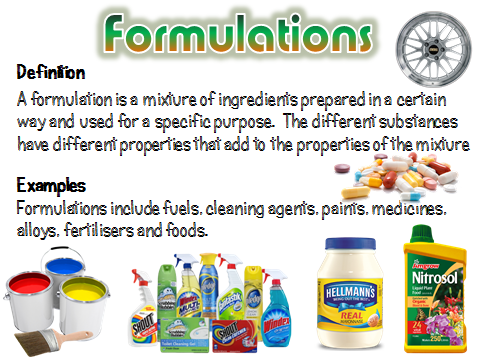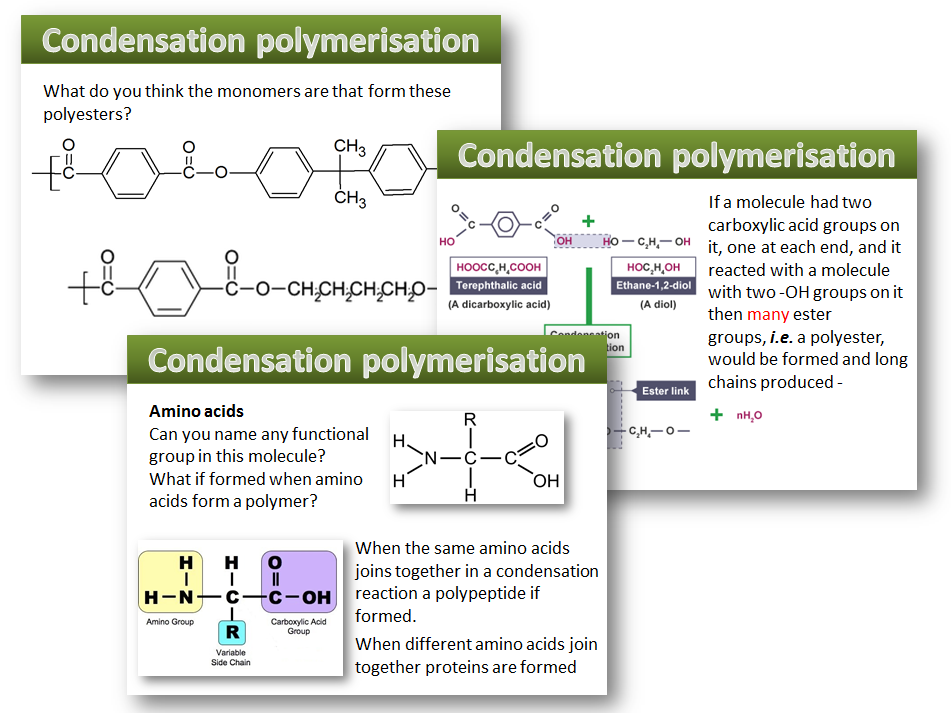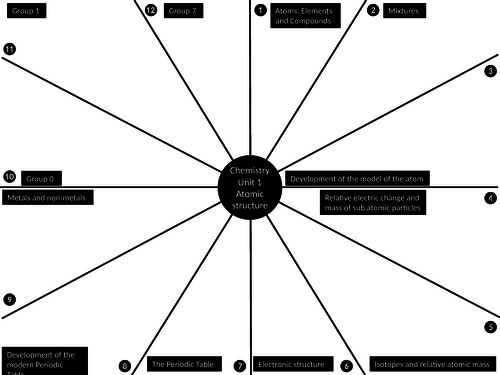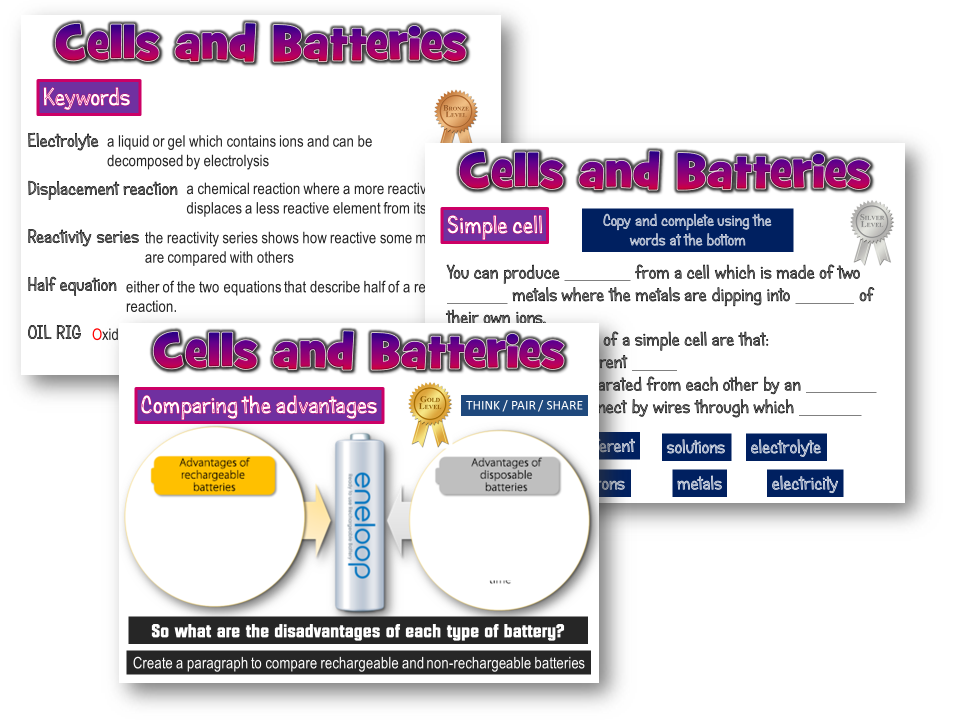
133Uploads
192k+Views
312k+Downloads
Chemistry

AQA The Alkali Metals
Presentation and linked worksheets to teach the subject content of the alkali metals for the new 2016 AQA Trilogy / Chemistry GCSE

Formulations - AQA Chemistry / Trilogy 2016
A fully resourced lesson, including practical on formulations. The presentation introduces the theory of formulations before students try to create a formulation of oil, water and emulsifier that takes a required time to separate. This time can be adjusted as required. There are two versions of the same PowerPoint for those who have versions that do not support some fonts

Energy Changes in Chemical Reactions
The third lesson in a series of 4 for the C5 topic - Energy Changes. Simple energy level diagrams are introduced and the concept of braking bonds being and endothermic process and making bonds an exothermic process is discussed. The idea of why a reaction eventually is exo or endo is then considered. A fully resourced lesson that can be taught stand alone

Climate change and global warming
A presentation and resources to teach the difference between global warming and climate change and to consider the consequences of climate change. Lesson 5 on the AQA unit for Chemistry of the atmosphere, but can be taught as a stand alone lesson

AQA Trilogy / Chemistry – Bond Energy Calculations
The fourth lesson in a series of 4 for the C5 topic – Bond energies are discussed and the combustion of methane is used to take pupils through the process of bond energy calculations before examples are provided for the students to try. A fully resourced lesson that can be taught stand alone. Answers are included.

AQA Chem / Trilogy - Evolution of the atmosphere
A presentation to teach the importance of evolution of algae and plants and the part played by the oceans in the development of the atmosphere. This is lesson three in the chemistry of the atmosphere unit for AQA, but can be taught as a stand alone lesson. Activities with answers are provided on the presentation.

AQA Trilogy / Chemistry – Uses of Exo and Endothermic Reactions
The second lesson in a series of 4 for the C5 topic - Energy Changes. The everyday uses of exothermic and endothermic reactions are discussed and I usually bring in examples of these for the pupils to see / touch. The presentation has several examples and also an extended written question to compare a single use hand warmer with a reusable one. The lesson is fully resourced and can be delivered as a stand alone lesson

AQA Chemistry / Trilogy - Carbon monoxide and Global dimming
A lesson to take pupils through the effects of carbon monoxide and global dimming. There are assessment opportunists within the presentation and a worksheet on the the cause and effect of global dimming. This is the 9 lesson in the series for the AQA unit on Chemistry of the atmosphere, but it can be taught as a stand alone lesson

Condensation polymerisation
A presentation with questions linked to the Organic Chemistry unit of the new AQA 1-9 course. There are assessment opportunities and worksheets that can be printed from the PowerPoint

AQA Chemistry / Trilogy - Gases in the atmosphere
A presentation with resources to introduce the unit on chemistry of the atmosphere. The idea of the changes in the atmosphere over time are introduced and present composition is discussed. Activities and answers, where appropriate, are included. This is the first in the series of lessons for the AQA unit on chemistry of the atmosphere, but it can be taught as a stand alone lesson

Revision clocks - Chemistry paper 1 - AQA Triology
Revision clocks for 4 of the 5 units for chemistry paper 1. Each unit is split into sub sections. Pupils are to spend no more than 4/5 minutes on each section to try and ensure that the whole of a topic is covered.

AQA Trilogy / Chemistry - Required Prac - Temperature Change
A presentation and worksheets to deliver the AQA required practical on temperature change. There are differentiated sheets to help with the graph drawing component of the activity, and some questions related to a linked video. Teacher / technician / students notes included, have been adapted from the AQA material.

Cells and Batteries - New AQA 2016 chemistry
A lesson for the new GCSE Chemistry for AQA triple award only. The resource includes a worksheet for a practical using metals and fruit juices to underpin the key-points from the syllabus on what effects the voltage in a simple cell and a presentation to reinforce key ideas. The presentation includes assessment opportunities to test pupils understanding and links in the topic to previous parts of the syllabus. The are two versions of the presentation - one that is suitable for those who have versions of PowerPoint that don't support some fonts

AQA Trilogy / Chemistry - Collision Theory
A fully resourced lesson including answers to introduce collision theory for the rate and extent of chemical change unit. Lesson 1 for this unit

Revision clocks - Chemistry paper 2 - AQA Trilogy
The last 5 units for the Chemistry Paper 2 split into sub sections. Pupils are to spend no more than 4/5 minutes on each section to try and ensure that the whole of a topic is covered.

Catalysts lesson and experiment
A fully resourced lesson on catalysts with questions on a worksheet for pupils to answer, linked to the presentation and an experiment to carry out

AQA Trilogy / Chemistry - Extraction of metals using carbon
A presentation with linked practical to teach pupils about the extraction of metals using reduction with carbon

AQA Trilogy / Chemistry - Metal and non-metal ions
A presentation and worksheet to take pupils through the process of ion formation in both metals and non-metals

Exo amd Endo reactions lesson
A presentation and resources for a lesson on Exo and Endothermic reactions, including a worksheet for a practical activity. I also buy some visual aides from the internet such as hand warmers and self heating cans. There are lots of sites where these are available.

AQA Trilogy / Chemistry - Metals and acid
A fully resourced lesson with practical and worksheet. Pupils are to deduce the reactivity of metals by comparison of their reactions in acid and link this to previous lessons on reactions of metals with water and oxygen.




















